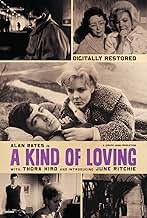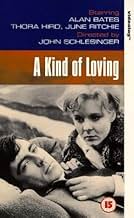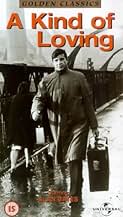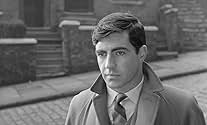IMDb-BEWERTUNG
7,3/10
2836
IHRE BEWERTUNG
Füge eine Handlung in deiner Sprache hinzuAfter his girlfriend's pregnancy forces him to marry her, a young man must adjust to his new life and contend with his domineering mother-in-law.After his girlfriend's pregnancy forces him to marry her, a young man must adjust to his new life and contend with his domineering mother-in-law.After his girlfriend's pregnancy forces him to marry her, a young man must adjust to his new life and contend with his domineering mother-in-law.
- Regie
- Drehbuch
- Hauptbesetzung
- Nominiert für 4 BAFTA Awards
- 1 Gewinn & 4 Nominierungen insgesamt
Empfohlene Bewertungen
What a great time in my life, I was 14 when this film was being made in my home town of Bolton. I had already appeared as a non speaking actor in numerous TV plays and was then offered the part of a "milk boy" in this first class film. I'm still there today in the background carrying some crates of empty milk bottles to the milk truck about 40 minutes into the film. I remember the scene was filmed in Ancoats Manchester early on a Sunday morning late in the year,it was rainy and cold, but I loved every minute of it. Met and played football with the late Alan Bates between takes, those were the days, happy or what?. After all these years its still a film which I never miss on TV and I recently bought the DVD. If you get the chance to watch this 60@s classic ,do so, you won't be disappointed.
June Ritchie makes this story work. She gives an unaffected portrayal of a young woman needing to overcome her vulnerability with a combination of guile and passive aggression. It's the truest and most honest performance in the film. Bates is a star, Ritchie works a miracle. James bolam is quietly brilliant and. The supporting cast is of the salt of the earth type of genius available to directors at that time. I did not read the book but I feel the this movie version makes the task unnecessary.? What a great period of story telling this was. Bates was wonderful on film but on stage he was even more special. I was lucky to experience both. His hamlet. Though forgotten, was so pure, so honest, so sexy.
I own very few movies - this is one of them. I've seen it many times and am always moved.
It is of course part of the special "Angry Young Man" genre that includes Billy Liar, The Loneliness of the Long Distance Runner, The Entertainer, Darling, A Taste of Honey, This Sporting Life, Look Back in Anger, Room at the Top, Saturday Night and Sunday Morning - and in later years, In Celebration and The Homecoming.
Such novelists/playwrights as John Braine, Alan Sillitoe, David Storey, John Osborne, Arnold Wesker, John Wain, Shelagh Delaney, directors like Karel Reisz, John Schlesinger, Lindsay Anderson and Tony Richardson, and such screenwriters as Waterhouse and Hall (who wrote this as Billy Liar).
The movies are primarily about men trapped by place and morality -- and either lashing out/escaping or trying to accommodate themselves to their situation. Most are set in the north of England - all are about people from working class backgrounds.
Stars like Richard Harris, Julie Christie, Alan Bates, Ian Holm, Albert Finney, and Tom Courtenay broke in their film teeth with these movies - and others such as Richard Burton, Lawrence Olivier, Laurence Harvey and Dirk Bogarde revealed their expansive range.
The protagonists are often not likable - certainly the pitiful Archie Rice in The Entertainer, Burton's character in Look Back in Anger, Finney's in Saturday Night and Sunday Morning, Courtenay's character in "Long Distance Runner" or Richard Harris' character -- are all people you'd rather not accompany on a long train journey.
However, Vic Brown, the protagonist in this one - is largely sympathetic (and wonderfully written and portrayed). His plight is just so realistic - and the consequences so easy to believe.
There are many things that our lad gets wrong - unable to break things off with a woman, he simply ignores her (and speaks badly of her to others) - yet is helpless when she suggests they get together again. In part, this is because his lust masters him - and in part because he just can't bear to tell someone he no longer wants to see her.
As awful as most audiences will find Ingrid's mother (wonderfully played), one can also have sympathy for her - a widow overly protective of her only child, and the circumstances in which her child finds herself.
The modesty of the characters is wonderful yet not overly done - it is the characteristic that yields immense sympathy in the viewer - this is especially true of the Brown family - from "our Christine" and her gentle husband to Vic's wonderful father and brother to his forceful mother.
Most of the reviews speak of this very much as a look back in time - I think it's not so past.
The themes are universal and timeless: lust and its consequences, indecision about a romantic partner, the division between a young person's caution about taking the right steps in life and closeness to family vs. inchoate yearnings to do great things far away - these are the stuff of such plays as The Fantasticks and such movies as It's a Wonderful Life. (Donna Reed's character wanted Jimmy Stewart's no less than Ingrid wanted Vic - and both men had dreamt to be far away doing great things).
This is wonderful - it will strike anyone as sharply observed, wonderfully written - and very moving.
It is of course part of the special "Angry Young Man" genre that includes Billy Liar, The Loneliness of the Long Distance Runner, The Entertainer, Darling, A Taste of Honey, This Sporting Life, Look Back in Anger, Room at the Top, Saturday Night and Sunday Morning - and in later years, In Celebration and The Homecoming.
Such novelists/playwrights as John Braine, Alan Sillitoe, David Storey, John Osborne, Arnold Wesker, John Wain, Shelagh Delaney, directors like Karel Reisz, John Schlesinger, Lindsay Anderson and Tony Richardson, and such screenwriters as Waterhouse and Hall (who wrote this as Billy Liar).
The movies are primarily about men trapped by place and morality -- and either lashing out/escaping or trying to accommodate themselves to their situation. Most are set in the north of England - all are about people from working class backgrounds.
Stars like Richard Harris, Julie Christie, Alan Bates, Ian Holm, Albert Finney, and Tom Courtenay broke in their film teeth with these movies - and others such as Richard Burton, Lawrence Olivier, Laurence Harvey and Dirk Bogarde revealed their expansive range.
The protagonists are often not likable - certainly the pitiful Archie Rice in The Entertainer, Burton's character in Look Back in Anger, Finney's in Saturday Night and Sunday Morning, Courtenay's character in "Long Distance Runner" or Richard Harris' character -- are all people you'd rather not accompany on a long train journey.
However, Vic Brown, the protagonist in this one - is largely sympathetic (and wonderfully written and portrayed). His plight is just so realistic - and the consequences so easy to believe.
There are many things that our lad gets wrong - unable to break things off with a woman, he simply ignores her (and speaks badly of her to others) - yet is helpless when she suggests they get together again. In part, this is because his lust masters him - and in part because he just can't bear to tell someone he no longer wants to see her.
As awful as most audiences will find Ingrid's mother (wonderfully played), one can also have sympathy for her - a widow overly protective of her only child, and the circumstances in which her child finds herself.
The modesty of the characters is wonderful yet not overly done - it is the characteristic that yields immense sympathy in the viewer - this is especially true of the Brown family - from "our Christine" and her gentle husband to Vic's wonderful father and brother to his forceful mother.
Most of the reviews speak of this very much as a look back in time - I think it's not so past.
The themes are universal and timeless: lust and its consequences, indecision about a romantic partner, the division between a young person's caution about taking the right steps in life and closeness to family vs. inchoate yearnings to do great things far away - these are the stuff of such plays as The Fantasticks and such movies as It's a Wonderful Life. (Donna Reed's character wanted Jimmy Stewart's no less than Ingrid wanted Vic - and both men had dreamt to be far away doing great things).
This is wonderful - it will strike anyone as sharply observed, wonderfully written - and very moving.
There's a frustrated young man, name of Vic, from a pool of young ladies he's picked, Ingrid Rothwell's her name, with a blonde flowing mane, she's the lass with whom he wants to tick. Ingrid's just as fond of this lad, now he's making advances she's glad, but he runs hot and cold, wants to do more than hold, so she lets him explore and un-clads. No surprise as nature takes its course, with a marriage hastily brought forth, which Vic starts to abhor, lives with Mother-in-Law, and his compass no longer points north.
Great dialogue, great performances, in a perpetually told tale of the ages, where the outcomes invariably reflect the times when the drama takes place, and leave you grateful for the times you live in today - I think it's called progress.
Great dialogue, great performances, in a perpetually told tale of the ages, where the outcomes invariably reflect the times when the drama takes place, and leave you grateful for the times you live in today - I think it's called progress.
10hague-1
I can watch this touching film over and over.
The black and white enhances the dramatic landscapes and atmosphere.
My favourite scene is the railway station where Vic hits rock bottom.
I also like the shelter scene as Vic pushes his luck and the picture pans back to the carved inscriptions.
It makes me wish I had been born in those times, with community spirit, dance halls and pubs with conversation for entertainment, football terraces and steam trains.
It is also interesting to spot so many young actors who found later fame such as "Nora Batty", James Bolam, Leonardo rossiter etc.
The black and white enhances the dramatic landscapes and atmosphere.
My favourite scene is the railway station where Vic hits rock bottom.
I also like the shelter scene as Vic pushes his luck and the picture pans back to the carved inscriptions.
It makes me wish I had been born in those times, with community spirit, dance halls and pubs with conversation for entertainment, football terraces and steam trains.
It is also interesting to spot so many young actors who found later fame such as "Nora Batty", James Bolam, Leonardo rossiter etc.
Wusstest du schon
- WissenswertesAt the start of this movie, Victor Arthur 'Vic' Brown (Sir Alan Bates) and some of his friends are seen perusing a magazine filled with shots of topless models. This is one of the first instances in British cinema showing bared breasts.
- PatzerIn the opening wedding scene, an elderly relative is prevented from taking photographs when the wedding car pulls up in front of her. She is, however, then seen taking pictures on the other side of the car as the bride and groom get in. Then as the car pulls away, she is back in her original position on the 'wrong' side of the car, still unable to take photos.
- Zitate
Mrs. Rothwell: How dare you! How dare you say such filthy, disgusting things! You come into this house drunk, filthy drunk! You're filthy! You talk filth, you ARE filth! You're filth! You filthy pig! You filthy, disgusting pig! Filth, FILTH!
- SoundtracksDown by the Riverside
(uncredited)
Written by Billy Sherrill and Charlie Rich
Sung at a bar on the pub crawl.
Top-Auswahl
Melde dich zum Bewerten an und greife auf die Watchlist für personalisierte Empfehlungen zu.
- How long is A Kind of Loving?Powered by Alexa
Details
- Erscheinungsdatum
- Herkunftsland
- Sprachen
- Auch bekannt als
- A Kind of Loving
- Drehorte
- The Promenade, St Anne's on Sea, Fylde, Lancashire, England, Vereinigtes Königreich(honeymoon of Vic and Ingrid)
- Produktionsfirmen
- Weitere beteiligte Unternehmen bei IMDbPro anzeigen
Box Office
- Budget
- 165.000 £ (geschätzt)
- Bruttoertrag in den USA und Kanada
- 6.912 $
- Eröffnungswochenende in den USA und in Kanada
- 3.278 $
- 9. Apr. 2017
- Weltweiter Bruttoertrag
- 6.912 $
- Laufzeit1 Stunde 47 Minuten
- Farbe
- Seitenverhältnis
- 1.66 : 1
Zu dieser Seite beitragen
Bearbeitung vorschlagen oder fehlenden Inhalt hinzufügen

Oberste Lücke
What is the French language plot outline for Nur ein Hauch Glückseligkeit (1962)?
Antwort































